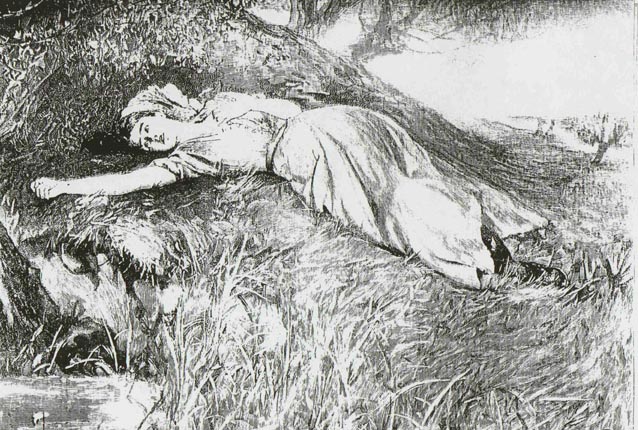On this day in 1857,
Charles Baudelaire published LES FLEURS DU MAL (Flowers of Evil), leading to his conviction on charges of blasphemy and obscenity.
"Hymn to Beauty"
Do you come from Heaven or rise from the abyss,
Beauty? Your gaze, divine and infernal,
Pours out confusedly benevolence and crime,
And one may for that, compare you to wine.
You contain in your eyes the sunset and the dawn;
You scatter perfumes like a stormy night;
Your kisses are a philtre, your mouth an amphora,
Which make the hero weak and the child courageous.
Do you come from the stars or rise from the black pit?
Destiny, bewitched, follows your skirts like a dog;
You sow at random joy and disaster,
And you govern all things but answer for nothing.
You walk upon corpses which you mock, O Beauty!
Of your jewels Horror is not the least charming,
And Murder, among your dearest trinkets,
Dances amorously upon your proud belly.
The dazzled moth flies toward you, O candle!
Crepitates, flames and says: "Blessed be this flambeau!"
The panting lover bending o'er his fair one
Looks like a dying man caressing his own tomb,
Whether you come from heaven or from hell, who cares,
O Beauty! Huge, fearful, ingenuous monster!
If your regard, your smile, your foot, open for me
An Infinite I love but have not ever known?
From God or Satan, who cares? Angel or Siren,
Who cares, if you make, — fay with the velvet eyes,
Rhythm, perfume, glimmer; my one and only queen!
The world less hideous, the minutes less leaden?
*
Modern poetry begins with Charles Baudelaire (1821-67), who employed his unequalled technical mastery to create the shadowy, desperately dramatic urban landscape — populated by the addicted and the damned — which so compellingly mirrors our modern condition. Deeply though darkly spiritual, titanic in the changes he wrought, Baudelaire looms over all the work, great and small, created in his wake. READ more here:
http://www.penguinrandomhouse.com/…/baudelaire-poems-by-ch…/
"The Sick Muse"
My poor Muse, alas! what ails you today?
Your hollow eyes are full of nocturnal visions;
I see in turn reflected on your face
Horror and madness, cold and taciturn.
Have the green succubus, the rosy elf,
Poured out for you love and fear from their urns?
Has the hand of Nightmare, cruel and despotic,
Plunged you to the bottom of some weird Minturnae?
I would that your bosom, fragrant with health,
Were constantly the dwelling place of noble thoughts,
And that your Christian blood would flow in rhythmic waves
Like the measured sounds of ancient verse,
Over which reign in turn the father of all songs,
Phoebus, and the great Pan, lord of harvest.
*
Modern poetry begins with Charles Baudelaire (1821-1867), who employed his unequaled technical mastery to create the shadowy, desperately dramatic urban landscape — populated by the addicted and the damned — which so compellingly mirrors our modern condition. Deeply though darkly spiritual, titanic in the changes he wrought, Baudelaire looms over all the work, great and small, created in his wake. READ more here:
https://www.penguinrandomhouse.com/…/baudelaire-poems-by-c…/


